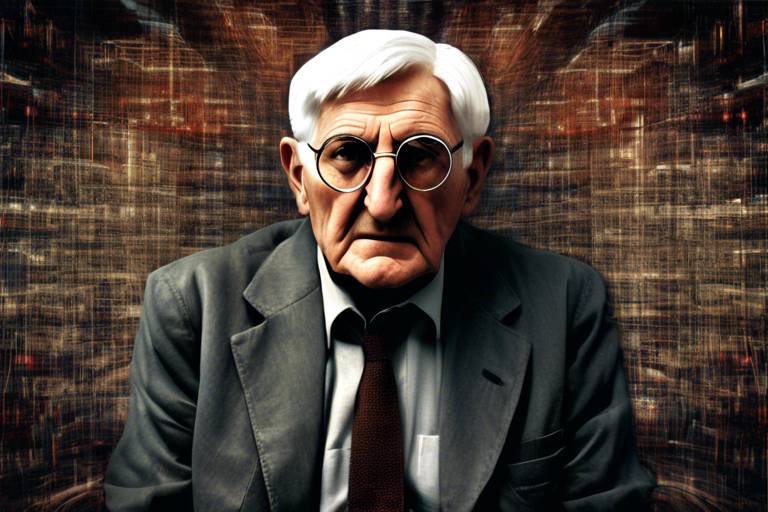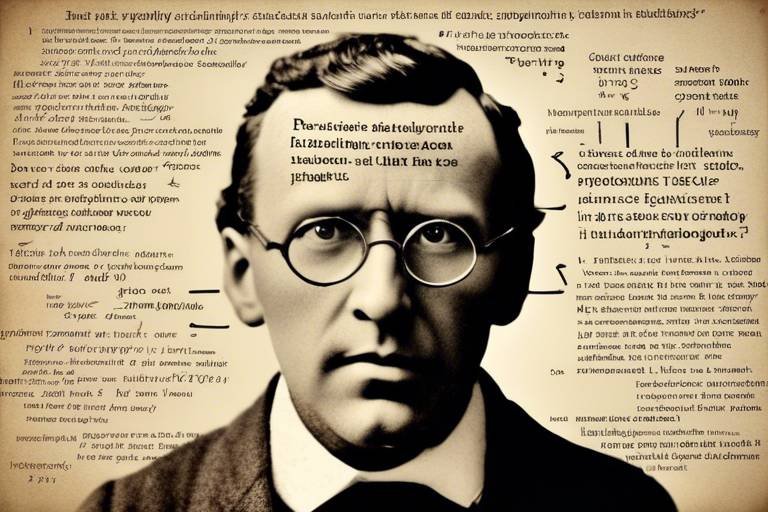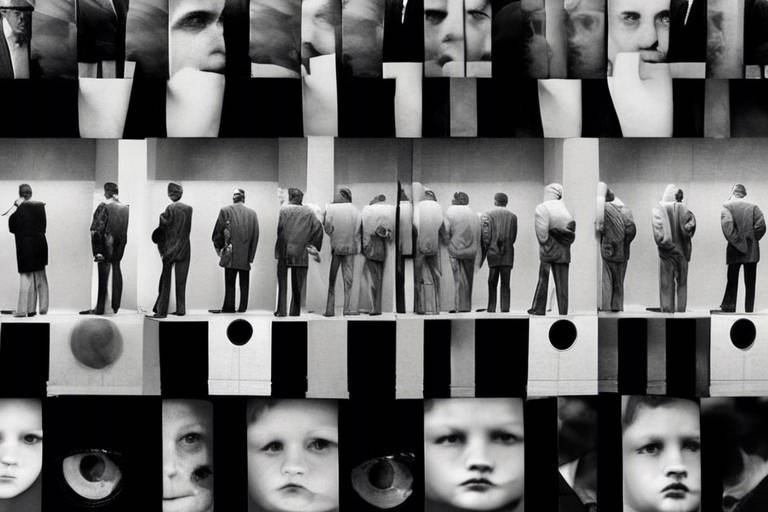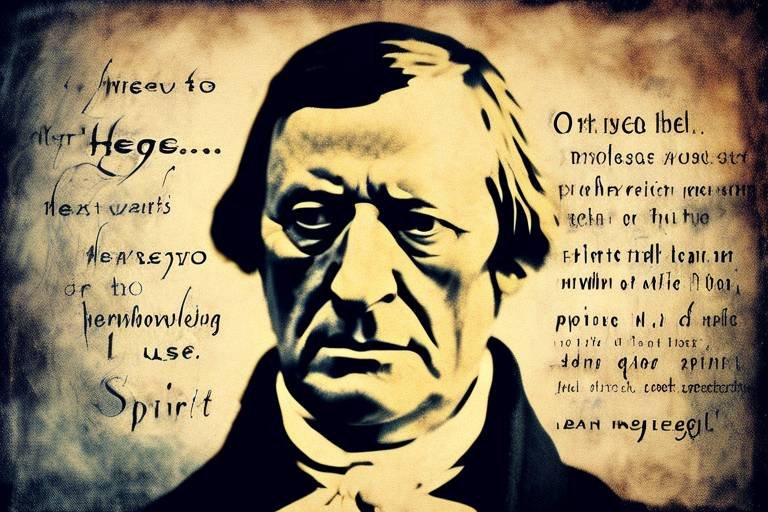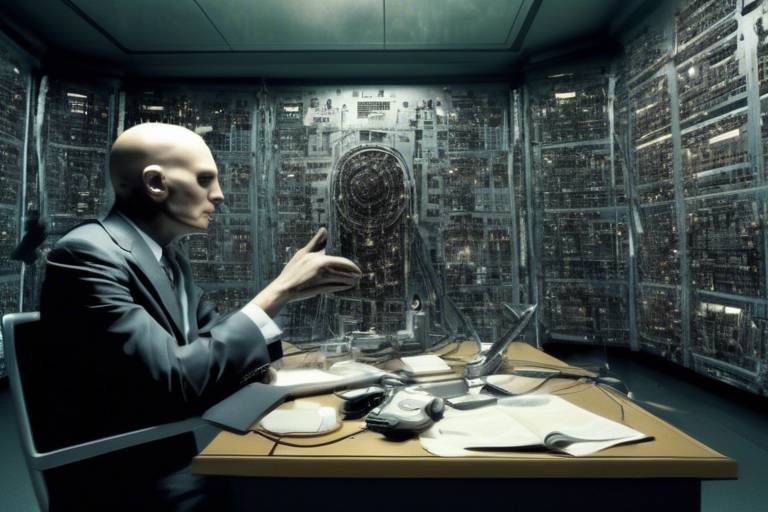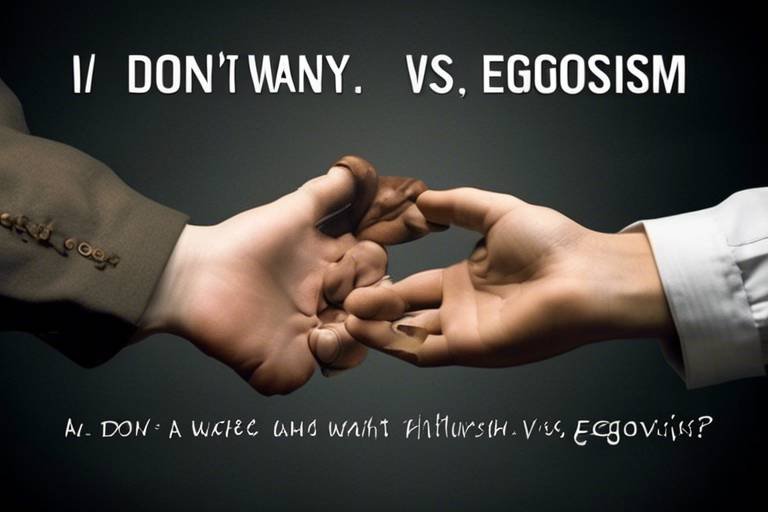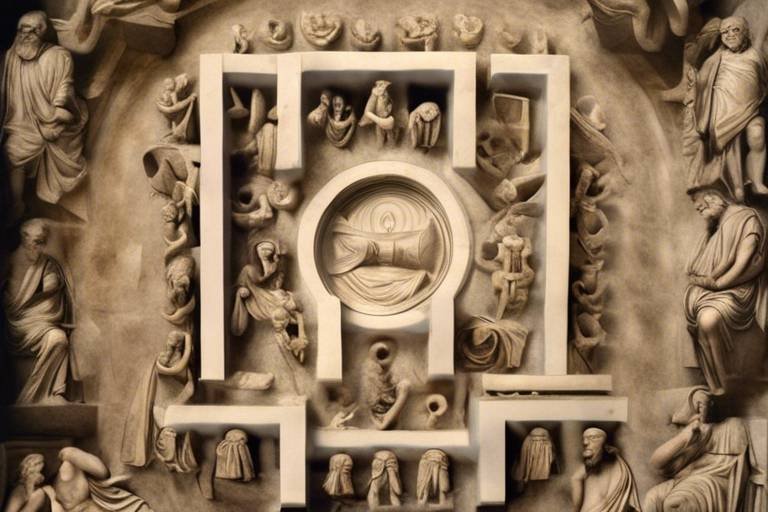Time and Space - Philosophical Perspectives
The concepts of time and space have baffled and intrigued philosophers for centuries. These two dimensions are not just mere backdrops for human existence; they are intertwined with our understanding of reality itself. Imagine time as a flowing river, constantly moving forward, while space is like the vast landscape surrounding it, filled with mountains, valleys, and everything in between. Together, they shape our experiences and perceptions of the world. In this article, we will dive into various philosophical perspectives on time and space, exploring how these ideas influence our existence, reality, and human experience through diverse lenses.
To grasp the current understanding of time, we must first journey back to the ancient philosophers who laid the groundwork for our thoughts today. For instance, Aristotle viewed time as linear, a series of moments that follow one another in a straight line. This perspective emphasized a beginning and an end, much like a story unfolding page by page. On the other hand, many Eastern philosophies embraced a more cyclical view of time, seeing it as a series of recurring events, akin to the seasons changing throughout the year. This divergence in thought has shaped our understanding of temporal existence in profound ways.
When we shift our focus to space, the philosophical interpretations become equally fascinating. Space is not merely an empty void; it is a complex relationship between objects, perception, and the universe itself. Different philosophical traditions have proposed various theories about space, from the idea that space is a container for objects to the notion that it is a construct of human perception. This exploration reveals the intricate layers of spatial understanding and how they impact our interaction with the world around us.
To illustrate the evolution of thought regarding space, we can contrast the ideas of Isaac Newton and Albert Einstein. Newton’s concept of absolute space defined space as a fixed, unchanging backdrop against which all events occur. He believed that space existed independently of the objects within it, much like a stage where actors perform their roles. This view influenced not only philosophy but also the development of classical physics.
Newton's absolute space is essential for understanding the framework of classical mechanics. It provided a sense of order and predictability, allowing scientists to calculate motion with precision. However, this perspective also raised questions about the nature of space itself. If space is absolute, what happens when objects move? Does space change, or does it remain constant regardless of the events taking place within it?
Enter Einstein, whose revolutionary idea of space-time transformed our understanding of the universe. In Einstein's view, space and time are interwoven, forming a four-dimensional continuum. This means that the fabric of the universe is not just a backdrop but is influenced by the objects within it, altering our perception of motion and gravity. Imagine a trampoline with a heavy ball placed in the center; the fabric dips and curves around the ball, demonstrating how mass affects the very structure of space-time.
Now, let’s delve into how human consciousness perceives time. Our subjective experiences play a crucial role in shaping our understanding of temporal flow. Have you ever noticed how time seems to fly when you’re having fun but drags on during a boring lecture? This psychological aspect of time perception reveals that our minds can manipulate how we experience time, making it feel elastic rather than fixed. This leads to intriguing questions: Is time a constant, or is it something we experience differently based on our emotions and activities?
As we ponder the nature of time, we encounter a significant philosophical debate: Is time an objective feature of the universe, or is it merely a subjective construct of human consciousness? This discussion opens up a myriad of arguments from both sides, each carrying profound implications for our understanding of existence. Some argue that time exists independently of human perception, while others contend that it is a mental framework we use to make sense of our experiences.
One fascinating aspect of this debate is the comparison between presentism and eternalism. Presentism posits that only the present moment is real, while eternalism argues that past, present, and future are equally real. This dichotomy reshapes our understanding of existence itself. If only the present is real, then what happens to our memories and future aspirations? Conversely, if all moments exist simultaneously, how do we navigate our lives in a linear fashion?
Finally, we arrive at the philosophical conundrum regarding whether time truly flows or if it is merely an illusion. Some philosophers argue that the flow of time is a fundamental aspect of our reality, while others suggest it is just a byproduct of our consciousness. This debate invites us to consider the very nature of reality and whether our perception of time is a reflection of the universe or a construct of our minds.
- What is the difference between time and space in philosophy?
Time is often viewed as a dimension that represents change and continuity, while space is the three-dimensional expanse in which objects and events occur. - How do different cultures perceive time?
Western cultures typically view time linearly, whereas many Eastern cultures see it as cyclical, reflecting different philosophical traditions. - What are presentism and eternalism?
Presentism holds that only the present is real, while eternalism posits that past, present, and future are equally real. - Is time an illusion?
Some philosophers argue that time is a construct of human consciousness, while others believe it is an objective feature of the universe.

Historical Views on Time
When we dive into the sea of history, we find that the concept of time has fascinated thinkers for centuries. Ancient philosophers, like Aristotle, viewed time through a linear lens, suggesting that it flows like a river, moving from the past, through the present, and into the future. This perspective was not just a mere observation; it shaped how people understood their lives and the world around them. Aristotle believed that time was a measure of change, a way to quantify the movement of objects and events. In his view, without change, time would not exist. Imagine trying to grasp a concept that is constantly in motion—confusing, right?
On the flip side, Eastern philosophies often embraced a more cyclical view of time. Think about the seasons: they repeat in a never-ending cycle, much like the ideas presented in Hindu and Buddhist traditions. In these cultures, time is not a straight line but a wheel that spins, where events recur and life is a series of rebirths. This cyclical perception of time offers a different lens through which to view our existence, suggesting that beginnings and endings are interconnected, like the yin and yang. It emphasizes the importance of the present moment while acknowledging the past and future as part of a larger continuum.
As we journey through time, we also encounter the medieval period, where the notion of time was heavily influenced by religious beliefs. The Christian perspective, for example, positioned time as a linear path leading towards an ultimate divine end. This view gave rise to the idea of eschatology, the study of the end times, where the future holds a significant weight in the grand narrative of existence. Here, time was not just a measure of change but a divine plan unfolding, with humanity playing a crucial role in its progression.
Moving into the modern era, philosophers like Kant began to challenge previous notions of time. He proposed that time is not an objective reality but rather a framework through which we perceive the world. In his view, time is innate to human consciousness, suggesting that our understanding of time is shaped by our experiences and perceptions. This idea invites us to consider: is time something we measure, or is it something we create? Kant's thoughts opened up a Pandora's box of questions about the nature of reality and our place within it.
In summary, historical views on time reflect a rich tapestry of ideas that have evolved over centuries. From Aristotle's linear approach to the cyclical nature found in Eastern philosophies, and the divine interpretations of the medieval period to Kant's revolutionary thoughts, each perspective contributes to our understanding of time today. It's a reminder that time, much like a river, can take many forms, flowing through the landscapes of human thought and experience.
- What is the difference between linear and cyclical views of time?
Linear views see time as a straight path from past to future, while cyclical views see it as a repeating cycle, much like the seasons. - How did religious beliefs influence the perception of time?
Religious perspectives often shaped time as a linear journey with a divine purpose, impacting how societies understood their existence. - What role does human consciousness play in our understanding of time?
Philosophers like Kant argue that our perception of time is shaped by our consciousness, suggesting that it is a subjective experience rather than an objective reality.

Space in Philosophy
When we think about space, it often conjures images of vast galaxies, empty voids, and the physical dimensions that surround us. Yet, in the realm of philosophy, space takes on a far more intricate and nuanced role. Philosophers have long grappled with the question: What is space, really? Is it merely an empty container for objects, or does it possess its own intrinsic qualities? This inquiry has led to diverse interpretations across different philosophical traditions, each adding layers to our understanding of this fundamental aspect of existence.
In Western philosophy, the discussion often begins with the ancient Greeks. Thinkers like Plato and Aristotle laid the groundwork, each presenting unique perspectives. Plato viewed space as a realm of forms, a sort of ideal backdrop where physical objects participate in a higher reality. Aristotle, on the other hand, perceived space as a more concrete entity, defining it as the place where objects exist and interact. His notion of space was deeply tied to physicality, emphasizing that it is not merely a void but rather a context for the existence of things.
As we journey through history, we encounter the Renaissance and the Enlightenment, periods that brought about significant shifts in the understanding of space. The introduction of Cartesian coordinates by René Descartes revolutionized how we visualize space, allowing for a more mathematical and systematic approach. This paved the way for modern physics, where space began to be seen as something that could be measured and quantified. However, this perspective also sparked debates about whether space is an objective reality or a mental construct shaped by human perception.
In contrast, Eastern philosophies, particularly those from Buddhism and Taoism, present a more fluid interpretation of space. They often emphasize the interconnectedness of all things, suggesting that space is not just an empty void but a dynamic and relational aspect of existence. In these traditions, space is often seen as a manifestation of impermanence, where everything is in a constant state of flux. This perspective invites us to reconsider our rigid notions of space and encourages a more holistic understanding of our place in the universe.
Furthermore, the advent of modern physics, particularly with the theories of relativity proposed by Albert Einstein, has transformed our philosophical inquiries into space. Einstein's revolutionary ideas suggest that space is not an absolute entity but is intertwined with time, creating a four-dimensional continuum known as space-time. This concept challenges traditional views and raises profound questions about the nature of reality itself. Are space and time separate dimensions, or are they two sides of the same coin? This philosophical dilemma continues to inspire debates among scholars and thinkers.
To encapsulate the complexities of space in philosophy, we can summarize some key perspectives:
- Western Philosophy: Space as a measurable, objective reality influenced by mathematical principles.
- Eastern Philosophy: Space as a dynamic, interconnected aspect of existence, emphasizing impermanence.
- Modern Physics: Space as a part of the space-time continuum, challenging traditional notions of separation between dimensions.
In conclusion, the exploration of space in philosophy is a rich tapestry woven from various strands of thought. Each perspective contributes to a deeper understanding of not only space itself but also our existence within it. As we continue to ponder these questions, we find ourselves at the intersection of science, metaphysics, and human experience, each informing and enriching our understanding of the universe we inhabit.
Q: What is the main difference between Western and Eastern philosophical views on space?
A: Western philosophy often views space as an objective, measurable reality, while Eastern philosophies see it as a dynamic and interconnected aspect of existence.
Q: How has modern physics influenced philosophical discussions about space?
A: The theories of relativity have introduced the concept of space-time, challenging traditional views of space as a separate and absolute entity.
Q: Why is the concept of space important in understanding our existence?
A: Space provides the context in which all objects and events occur, shaping our perception of reality and our place within the universe.

Newtonian vs. Einsteinian Concepts
When we think about space and time, the names Newton and Einstein often come to mind. These two titans of science had drastically different views that not only shaped physics but also influenced philosophical thought. Newton, with his classical mechanics, introduced a concept of space that was absolute—a fixed, unchanging backdrop against which all events unfold. Imagine a stage where every play occurs; the stage itself never changes, regardless of the drama that unfolds upon it. This idea of absolute space was revolutionary in its time, suggesting that space exists independently of the objects within it. It laid the groundwork for the laws of motion and gravity, making sense of how objects interact in a seemingly predictable universe.
In stark contrast, Einstein shattered this notion with his theory of relativity. He proposed that space and time are not separate entities but are intertwined in a four-dimensional fabric known as space-time. This concept suggests that the presence of mass can curve this fabric, affecting how objects move and how time is experienced. Picture a trampoline with a heavy ball placed in the center; the fabric bends around the ball, illustrating how mass influences the geometry of space. This revolutionary idea has profound implications: it means that time can vary depending on the observer's speed and gravitational field. If you're traveling near the speed of light or are near a massive object, time can actually slow down for you compared to someone far away. This isn’t just theoretical; it has been confirmed through various experiments, such as observing the decay rates of particles moving at high speeds.
To better understand the differences between these two concepts, consider the following table:
| Aspect | Newtonian Concept | Einsteinian Concept |
|---|---|---|
| Nature of Space | Absolute and unchanging | Relative and dynamic |
| Nature of Time | Universal and constant | Variable and dependent on speed/gravity |
| Relationship | Independent of matter | Interdependent with matter |
| Philosophical Implication | Objective reality | Subjective experience |
This table encapsulates the essence of how our understanding of space and time has transformed over the centuries. While Newton's framework allowed for significant advancements in physics, Einstein's theories opened up a realm of possibilities that challenged our very perception of reality. It raises fascinating questions: Is time merely a human construct shaped by our experiences? Or is it an objective feature of the universe, existing independently of our perception? The clash between these two views continues to reverberate through both scientific inquiry and philosophical debate.
In summary, the transition from Newtonian to Einsteinian concepts represents a monumental shift in our understanding of the universe. It invites us to rethink our assumptions about the nature of reality itself. As we delve deeper into these ideas, we find that the boundaries between philosophy and science blur, leading us to explore the very fabric of existence.
- What is the main difference between Newtonian and Einsteinian concepts?
Newtonian concepts view space and time as absolute and independent, while Einsteinian concepts see them as relative and interconnected. - How did Einstein's theory of relativity change our understanding of time?
Einstein's theory introduced the idea that time can be affected by speed and gravity, making it a relative experience rather than a fixed measure. - What are some practical applications of Einstein's theories?
Einstein's theories have practical applications in technologies like GPS, where the effects of relativity must be considered for accurate positioning.

Absolute Space
When we think about the concept of , we often picture a vast, unchanging canvas that serves as the backdrop for all events in the universe. This idea, primarily attributed to the great physicist Isaac Newton, suggests that space exists independently of the objects within it. Imagine a stage where actors perform; the stage itself remains constant, regardless of the drama unfolding upon it. In this analogy, the stage represents absolute space, a fixed entity that allows for the occurrence of movement and events.
Newton proposed that absolute space is not merely a collection of distances between objects but rather a distinct entity that provides a framework for understanding the physical world. He argued that even in the absence of matter, space would still exist. This notion has profound implications, as it implies that space is an inherent quality of the universe, a silent witness to all that transpires. In contrast, many philosophers and scientists have debated this perspective, questioning whether space can truly be considered independent of the objects it contains.
One of the key discussions surrounding absolute space is its relationship to motion. Newton famously stated that "absolute space, in its own nature, without regard to anything external, remains always similar and immovable." This idea leads us to ponder: if space is indeed absolute, how do we measure motion? The answer lies in Newton's laws of motion, which allow us to quantify how objects move through this unchanging backdrop. However, this perspective raises further questions about the nature of reality itself. Is it possible for something to exist in a vacuum, devoid of any interaction with other entities?
To understand the implications of absolute space, we can examine a few key points:
- Independence: Absolute space exists independently of matter, suggesting a realm that is unaffected by the physical world.
- Framework for Motion: It provides a consistent framework against which motion can be measured, leading to the development of classical mechanics.
- Philosophical Debate: The existence of absolute space has sparked philosophical debates about the nature of reality and the relationship between space and objects.
Despite its foundational role in classical physics, the idea of absolute space has faced significant challenges, particularly with the advent of Einstein's theory of relativity. Einstein proposed a radical shift in our understanding by suggesting that space is not a fixed entity but rather intertwined with time, creating a dynamic fabric known as space-time. This theory fundamentally altered how we perceive the universe, leading many to question the validity of Newton's absolute space. As we delve deeper into the philosophical implications of these contrasting views, we begin to appreciate the complexity of our understanding of existence and the universe.
Q: What is absolute space?
A: Absolute space is a concept introduced by Isaac Newton, suggesting that space exists independently of the objects within it, serving as a fixed backdrop for all events.
Q: How does absolute space relate to motion?
A: Absolute space provides a consistent framework against which motion can be measured, allowing for the understanding of how objects move through this unchanging backdrop.
Q: What challenges does the concept of absolute space face?
A: The rise of Einstein's theory of relativity challenges the notion of absolute space by introducing the idea of space-time, where space and time are interwoven and not independent entities.

Relativity and Space-Time
When we think about the universe, we often picture a vast, unchanging backdrop where everything happens. However, Einstein's theory of relativity flipped that notion on its head, introducing us to the mesmerizing concept of space-time. Instead of viewing space and time as separate entities, Einstein proposed that they are intertwined, forming a four-dimensional fabric that shapes our reality. Imagine a piece of fabric where every thread represents a moment in time and a point in space; this is how space-time operates, and it fundamentally alters our understanding of motion and gravity.
To grasp the implications of this theory, consider how gravity works differently in this new framework. In Newtonian physics, gravity was a force acting at a distance, pulling objects towards one another. But in Einstein's view, gravity is not just a mysterious force; it's a curvature of space-time itself. Picture placing a heavy ball on a trampoline: the fabric bends around the ball, creating a dip. When a smaller ball rolls nearby, it doesn't just move in a straight line; it follows the curve created by the larger ball's mass. This analogy illustrates how massive objects like planets and stars warp the space-time around them, influencing the paths of other objects and even light.
This revolutionary perspective has profound implications for our understanding of the universe. For instance, it allows us to comprehend why time can flow differently depending on the strength of a gravitational field. Have you ever experienced a moment where time seemed to fly by or drag on? This isn't just a perception; it's a reflection of how time can stretch and compress based on the space-time curvature. Time dilation is a real phenomenon where time moves slower in stronger gravitational fields, which has been confirmed through various experiments, such as observing atomic clocks at different altitudes.
Moreover, the concept of space-time leads us to ponder deeper questions about the universe itself. If space and time are indeed woven together, what does that mean for our understanding of causality and the flow of events? Are past, present, and future merely different dimensions within this fabric? These questions propel us into the realm of philosophy, where the implications of relativity challenge our traditional notions of existence.
As we delve deeper into the mysteries of space-time, we uncover not only the mechanics of the universe but also the profound interconnectedness of all things. The dance of galaxies, the ticking of clocks, and the very essence of our experiences are all part of this grand tapestry. The more we learn about relativity and space-time, the more we realize that our universe is not a static stage but a dynamic, ever-evolving entity, inviting us to explore its depths.
- What is space-time? Space-time is a four-dimensional continuum that merges the three dimensions of space with the dimension of time, as proposed by Einstein's theory of relativity.
- How does gravity affect time? According to relativity, time moves slower in stronger gravitational fields, a phenomenon known as time dilation.
- What are the implications of space-time for our understanding of the universe? Space-time challenges traditional views of time and causality, suggesting that past, present, and future may be interconnected within the fabric of the universe.

Time Perception and Consciousness
Have you ever noticed how time seems to fly when you're having fun but drags on during a boring lecture? This curious phenomenon is rooted in our perception of time, which is not a straightforward measurement but rather a complex interplay of consciousness, memory, and emotion. Philosophers and psychologists alike have pondered this perplexing aspect of human experience, leading to a rich tapestry of insights that help us understand how we experience the world around us.
At the heart of our perception of time is the idea that it is not merely a ticking clock but a deeply subjective experience. When we engage in activities that captivate our attention, our brains seem to compress time, allowing us to feel as if hours have passed in mere minutes. Conversely, during times of stress or boredom, our perception stretches, making even the briefest moments feel interminable. This subjective experience can be attributed to the way our consciousness processes events, categorizes experiences, and retrieves memories.
Research in psychology has shown that our emotional state significantly influences how we perceive time. For instance, when we are excited or happy, our brains tend to process information more efficiently, leading to a compressed sense of time. On the other hand, during periods of anxiety or fear, our brains become hyper-aware of our surroundings, causing time to feel as though it is dragging. This connection between emotion and time perception highlights the intricate relationship between our mental state and our experience of reality.
Moreover, memory plays a crucial role in how we perceive time. The more memories we create during a particular event, the richer our experience of that time period becomes. For example, a vibrant vacation filled with new experiences will often feel longer in retrospect than a monotonous week at work. This phenomenon suggests that time is not just a linear progression but is intricately woven into the fabric of our memories and experiences.
To further illustrate this concept, consider the following table that summarizes different factors affecting time perception:
| Factor | Effect on Time Perception |
|---|---|
| Emotion | Positive emotions can compress time; negative emotions can stretch it. |
| Attention | Focused attention can make time feel shorter; distraction can make it feel longer. |
| Memory Density | More memories create a richer experience, making time feel longer in retrospect. |
As we dive deeper into the philosophy of time perception, we encounter various theories that attempt to explain our conscious experience of time. Some philosophers argue that time is a mental construct, shaped by our perceptions and experiences rather than an objective reality. Others contend that time exists independently of human consciousness, waiting to be measured and understood. This ongoing debate raises intriguing questions about the nature of existence itself: Is time something we create in our minds, or is it an inherent feature of the universe?
Ultimately, our perception of time is a fascinating blend of subjective experience and objective reality, shaped by our consciousness, emotions, and memories. As we continue to explore the depths of this complex relationship, we may uncover new insights that not only enhance our understanding of time but also illuminate the very essence of what it means to be human.
- What is time perception? Time perception refers to the subjective experience of time, influenced by various factors such as emotion, attention, and memory.
- How does emotion affect time perception? Positive emotions can compress our sense of time, while negative emotions can stretch it, altering our experience of events.
- Is time perception the same for everyone? No, time perception can vary significantly from person to person based on individual experiences and mental states.
- Can time perception be altered? Yes, certain practices like mindfulness and meditation can enhance awareness of time and may alter perception.

The Nature of Temporal Reality
The concept of time has perplexed thinkers for centuries, stirring debates that traverse the realms of science, philosophy, and even art. At its core, the question revolves around whether time is an objective feature of the universe—something that exists independently of human perception—or a subjective construct shaped by our consciousness. This inquiry isn't merely academic; it fundamentally influences how we understand our existence and the universe around us. Imagine time as a river flowing through our lives, with each moment a droplet glistening in the sunlight. But is this river real, or is it just an illusion crafted by our minds?
To explore this, we can look at two primary philosophical positions: presentism and eternalism. Presentism asserts that only the present moment is real; the past has faded away, and the future is yet to come. This perspective aligns with our everyday experiences. We live in the moment, and our memories of the past feel like faded photographs, while the future seems like a blank canvas waiting to be painted. In contrast, eternalism posits that past, present, and future are equally real, akin to a vast landscape where all moments coexist simultaneously. This viewpoint challenges our intuitive understanding of time, suggesting that every moment exists in a sort of timeless tapestry.
Consider the implications of these perspectives. If we adopt presentism, we might feel a sense of urgency, as if we must seize the day, for it is all we have. However, eternalism offers a comforting thought: every moment we've experienced and every moment we have yet to encounter are part of a grand design. This realization can evoke a sense of peace, knowing that our lives are woven into a larger narrative that transcends the fleeting nature of time.
Furthermore, the debate extends into the realm of physics. Theories from quantum mechanics and relativity challenge our traditional notions of time. For instance, in quantum physics, particles can exist in multiple states at once, suggesting that time may not be as linear as we perceive it. This leads to fascinating questions: Does the universe have a preferred direction of time? Or is it merely a construct of human cognition, a way for us to make sense of the chaos around us?
| Philosophical Position | Key Characteristics |
|---|---|
| Presentism | Only the present is real; past and future do not exist. |
| Eternalism | All points in time (past, present, future) are equally real. |
Ultimately, the nature of temporal reality invites us to reflect on our own experiences. How do we perceive time? Is it a constant march forward, or can we find moments where time seems to stand still? Think back to a moment of joy or sadness—a fleeting second that felt like an eternity. These subjective experiences shape our understanding of time and reality, reminding us that while we may seek objective truths, our individual perceptions color the canvas of existence.
- What is presentism? Presentism is the philosophical view that only the present moment is real, while the past and future do not exist.
- What is eternalism? Eternalism posits that all points in time—past, present, and future—are equally real and exist simultaneously.
- How does physics relate to the nature of time? Theories in physics, such as quantum mechanics and relativity, challenge traditional notions of time, suggesting it may not be linear or absolute.
- Can our perception of time affect our reality? Yes, our subjective experiences and perceptions of time can significantly influence how we understand and interact with the world around us.

Presentism vs. Eternalism
The debate between presentism and eternalism is one of the most intriguing discussions in the realm of philosophy, particularly concerning the nature of time. At its core, presentism asserts that only the present moment is real. In this view, the past is merely a memory, and the future is a mere possibility, existing only in our imagination. This perspective resonates with our daily experiences; after all, when we think about our lives, we are constantly anchored in the present. Imagine standing on a beach, feeling the waves lap at your feet. That sensation, that moment, is undeniably real. But what about the tides that have come and gone? Or the waves yet to crash? Presentism argues that these are not real in the same way that your current experience is.
On the other hand, eternalism presents a contrasting view. It posits that all points in time—past, present, and future—are equally real. To eternalists, time is akin to a vast landscape, where every moment exists simultaneously, much like a film reel where all frames are present, regardless of whether they are being viewed or not. This perspective can be quite mind-bending. If we consider time as a dimension similar to space, then just as every point in space exists, every moment in time does too. Imagine a library where every book represents a moment in time. Just because you're reading one book (the present) doesn't mean the others (the past and future) don't exist; they are simply waiting for you to explore them.
Both perspectives come with their own implications. Presentism aligns well with our intuitive understanding of time, yet it raises challenging questions about the nature of change and causality. If only the present is real, how do we account for the events that lead to our current situation? Conversely, eternalism, while providing a more comprehensive view of time, can feel counterintuitive. It challenges our perception of free will and the very nature of existence. Are we merely spectators in a pre-written script, or do we have agency in shaping our paths?
To further clarify these concepts, let's look at a comparative table:
| Aspect | Presentism | Eternalism |
|---|---|---|
| Reality of Time | Only the present is real | All moments in time are equally real |
| Perception of Change | Change occurs in the present | Change is a part of the entire timeline |
| Implications for Free Will | Supports free will; we shape the present | Challenges the notion of free will |
| Philosophical Challenges | How to account for the past and future? | How to reconcile with subjective experience? |
In summary, the presentism vs. eternalism debate not only shapes our understanding of time but also influences our perceptions of existence and reality. Whether we lean towards the immediacy of presentism or the expansive view of eternalism, each perspective offers a unique lens through which we can explore the complexities of our temporal experience. As we continue to ponder these philosophical questions, we may find that our understanding of time is as fluid as the moments we live through, constantly evolving and reshaping our reality.
- What is presentism? Presentism is the philosophical view that only the present moment is real, with the past and future being non-existent.
- What is eternalism? Eternalism posits that all points in time are equally real, suggesting that the past, present, and future exist simultaneously.
- How do presentism and eternalism affect our understanding of free will? Presentism supports the idea of free will, while eternalism challenges it by suggesting that all moments are predetermined.
- Can I believe in both presentism and eternalism? While they are opposing views, some people may find value in aspects of both perspectives, leading to a more nuanced understanding of time.

The Flow of Time
The concept of time has intrigued philosophers, scientists, and everyday folks alike for centuries. When we talk about the flow of time, we often picture it as a river, continuously moving forward, carrying us along with it. But is this flow a tangible reality, or merely an illusion crafted by our perception? This question has sparked countless debates and led to diverse interpretations across various philosophical schools of thought.
On one side of the argument, we have those who assert that time indeed flows. This perspective aligns with our everyday experiences. We wake up, go through our routines, and eventually, the day fades into night. Our memories, marked by a sequence of events, create a narrative that feels linear and progressive. This view suggests that time is not just a static dimension but a dynamic aspect of our existence that influences how we perceive reality.
However, there’s another camp that challenges this notion. Some philosophers argue that time is an illusion, a construct of human consciousness. They suggest that if we were to observe the universe from a broader perspective, time might appear as a series of moments rather than a flowing entity. This idea is reminiscent of the block universe theory, which posits that past, present, and future are equally real, existing simultaneously. In this view, time does not flow; instead, it’s like a landscape laid out before us, where all moments coexist, and our perception of movement through time is merely a trick of the mind.
To illustrate this philosophical dichotomy, consider the following table that summarizes the key differences between the two perspectives:
| Aspect | Flow of Time | Timeless Perspective |
|---|---|---|
| Nature | Dynamic and progressive | Static and unchanging |
| Experience | Subjective and linear | Objective and simultaneous |
| Philosophical View | Presentism | Eternalism |
As we delve deeper into this debate, we encounter various implications that arise from each perspective. For instance, if we accept that time flows, we might conclude that our choices and actions have significant weight, as they lead us down a path of future possibilities. Conversely, if time is an illusion, we could argue that our sense of agency is diminished, as all events are predetermined within the fabric of the universe.
Moreover, the flow of time also intersects with the realm of science. In physics, the concept of time is often treated as a measurable quantity, yet the interpretation of its flow remains contentious. Einstein’s theory of relativity suggests that time can stretch and contract based on speed and gravity, further complicating our understanding. Does this mean that time flows differently for each observer? This question opens the door to a myriad of interpretations that blend philosophy with empirical science.
Ultimately, the flow of time is a captivating topic that invites us to reflect on our existence and the nature of reality itself. Whether we view time as a flowing river or a static landscape, it undeniably shapes our experiences, influences our decisions, and colors our perceptions of the world around us. So, the next time you find yourself pondering the passage of time, remember that this seemingly simple concept is anything but straightforward.
- What is the flow of time? The flow of time refers to the perception that time moves forward in a linear fashion, influencing our experiences and decisions.
- Is time an illusion? Some philosophers argue that time is an illusion, proposing that all moments exist simultaneously rather than flowing from past to future.
- How does science view time? In science, time is often treated as a measurable quantity, but theories like relativity suggest that its flow can vary based on speed and gravity.
Frequently Asked Questions
- What is the philosophical significance of time?
Time has been a central theme in philosophy, influencing our understanding of existence and reality. Philosophers like Aristotle viewed time as linear, while Eastern traditions often perceive it as cyclical. This divergence shapes how we experience life and our place within the universe.
- How do different cultures interpret space?
Space is perceived differently across cultures and philosophical traditions. Some view it as a mere backdrop for events, while others see it as intertwined with perception and existence. This complexity reveals how our understanding of space can influence our interactions with the world around us.
- What is the difference between Newtonian and Einsteinian concepts of space?
Newtonian space is seen as absolute and unchanging, a fixed stage for events. In contrast, Einstein's theory of relativity introduces the concept of space-time, where space and time are interwoven, fundamentally altering our understanding of motion and gravity.
- How does human consciousness affect our perception of time?
Human consciousness plays a crucial role in how we perceive time. Our subjective experiences, memories, and psychological states can distort our sense of temporal flow, making it feel faster or slower depending on various factors, such as emotional states or life experiences.
- Is time an objective feature of the universe or a subjective construct?
This is a hotly debated topic in philosophy. Presentism argues that only the present moment is real, while eternalism suggests that past, present, and future are equally real. Each perspective has profound implications for how we understand existence and reality.
- Does time truly flow, or is it an illusion?
The debate over whether time flows or is merely an illusion is ongoing. Some argue that time's flow is a fundamental aspect of our experience, while others suggest it might be a construct of human perception, challenging our understanding of reality.



